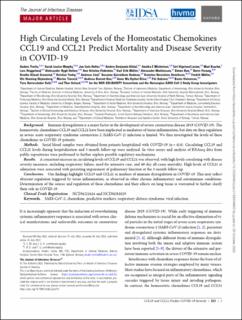| dc.contributor.author | Tveita, Anders Aune | |
| dc.contributor.author | Murphy, Sarah Louise Mikalsen | |
| dc.contributor.author | Holter, Jan Cato | |
| dc.contributor.author | Kildal, Anders Benjamin | |
| dc.contributor.author | Michelsen, Annika Elisabet | |
| dc.contributor.author | Lerum, Tøri Vigeland | |
| dc.contributor.author | Kaarbø, Mari | |
| dc.contributor.author | Heggelund, Lars | |
| dc.contributor.author | Holten, Aleksander Rygh | |
| dc.contributor.author | Finbråten, Ane-Kristine | |
| dc.contributor.author | Muller, Karl Erik | |
| dc.contributor.author | Mathiessen, Alexander | |
| dc.contributor.author | Bøe, Simen | |
| dc.contributor.author | Fevang, Børre | |
| dc.contributor.author | Granerud, Beathe Kiland | |
| dc.contributor.author | Tonby, Kristian | |
| dc.contributor.author | Lind, Andreas | |
| dc.contributor.author | Dudman, Susanne | |
| dc.contributor.author | Nezvalova-Henriksen, Katerina | |
| dc.contributor.author | Müller, Fredrik | |
| dc.contributor.author | Skjønsberg, Ole Henning | |
| dc.contributor.author | Trøseid, Marius | |
| dc.contributor.author | Barratt-Due, Andreas | |
| dc.contributor.author | Riise, Anne Margarita Dyrhol | |
| dc.contributor.author | Aukrust, Pål | |
| dc.contributor.author | Halvorsen, Bente Evy | |
| dc.contributor.author | Dahl, Tuva Børresdatter | |
| dc.contributor.author | Ueland, Thor | |
| dc.date.accessioned | 2022-10-28T12:19:33Z | |
| dc.date.available | 2022-10-28T12:19:33Z | |
| dc.date.created | 2022-08-22T15:29:04Z | |
| dc.date.issued | 2022 | |
| dc.identifier.issn | 0022-1899 | |
| dc.identifier.uri | https://hdl.handle.net/11250/3028884 | |
| dc.description.abstract | Background
Immune dysregulation is a major factor in the development of severe coronavirus disease 2019 (COVID-19). The homeostatic chemokines CCL19 and CCL21 have been implicated as mediators of tissue inflammation, but data on their regulation in severe acute respiratory syndrome coronavirus 2 (SARS-CoV-2) infection is limited. We thus investigated the levels of these chemokines in COVID-19 patients.
Methods
Serial blood samples were obtained from patients hospitalized with COVID-19 (n = 414). Circulating CCL19 and CCL21 levels during hospitalization and 3-month follow-up were analyzed. In vitro assays and analysis of RNAseq data from public repositories were performed to further explore possible regulatory mechanisms.
Results
A consistent increase in circulating levels of CCL19 and CCL21 was observed, with high levels correlating with disease severity measures, including respiratory failure, need for intensive care, and 60-day all-cause mortality. High levels of CCL21 at admission were associated with persisting impairment of pulmonary function at the 3-month follow-up.
Conclusions
Our findings highlight CCL19 and CCL21 as markers of immune dysregulation in COVID-19. This may reflect aberrant regulation triggered by tissue inflammation, as observed in other chronic inflammatory and autoimmune conditions. Determination of the source and regulation of these chemokines and their effects on lung tissue is warranted to further clarify their role in COVID-19. | en_US |
| dc.language.iso | eng | en_US |
| dc.publisher | Oxford University Press | en_US |
| dc.rights | Attribution-NonCommercial-NoDerivatives 4.0 Internasjonal | * |
| dc.rights.uri | http://creativecommons.org/licenses/by-nc-nd/4.0/deed.no | * |
| dc.title | High circulating levels of the homeostatic chemokines CCL19 and CCL21 predict mortality and disease severity in Covid-19 | en_US |
| dc.type | Journal article | en_US |
| dc.type | Peer reviewed | en_US |
| dc.description.version | publishedVersion | en_US |
| dc.rights.holder | Copyright 2022 The Author(s) | en_US |
| cristin.ispublished | true | |
| cristin.fulltext | original | |
| cristin.qualitycode | 2 | |
| dc.identifier.doi | 10.1093/infdis/jiac313 | |
| dc.identifier.cristin | 2045049 | |
| dc.source.journal | Journal of Infectious Diseases | en_US |
| dc.identifier.citation | Journal of Infectious Diseases. 2022. | en_US |

